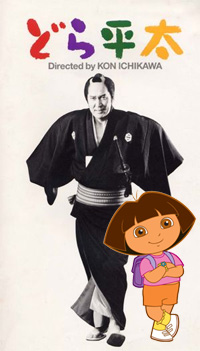 Dodesukaden, our last month’s film club title, was not originally supposed to be the first (and ultimately only) film produced by the Club of Four Knights, the production company set up by Akira Kurosawa, Kon Ichikawa, Keisuke Kinoshita and Masaki Kobayashi to revitalise the Japanese film industry and, some have suggested, Kurosawa’s career. A strong contender for the first project was the script for Dora-Heita (どら平太), a comic samurai film and the film that we will be discussing this month.
Dodesukaden, our last month’s film club title, was not originally supposed to be the first (and ultimately only) film produced by the Club of Four Knights, the production company set up by Akira Kurosawa, Kon Ichikawa, Keisuke Kinoshita and Masaki Kobayashi to revitalise the Japanese film industry and, some have suggested, Kurosawa’s career. A strong contender for the first project was the script for Dora-Heita (どら平太), a comic samurai film and the film that we will be discussing this month.
Although written in 1969, Dora-Heita was committed to cellulose only as late as 2000, after all but one of the original four screenwriters had passed away. The only survivor, Kon Ichikawa, helmed the production and turned out a film which received a polite, if not exactly enthusiastic response from critics.
Dora-Heita narrates the exploits of the titular gentleman (the nickname stands for “alley cat” or “playboy”) who comes to a corrupt town disguised as an alcoholic magistrate. In reality a more than capable samurai sent by the local daimyo, his mission is to clean up the town’s crime and lawlessness. Given the basic setup, it is not surprising that the film has often been compared to Kurosawa’s Yojimbo, although in terms of mood and style, it perhaps rather resembles its sequel, Sanjuro. In any case, the comparison is inconvenient for the film, for although it is more than competent, Ichikawa’s 83rd feature film doesn’t quite reach the levels of excellence of the samurai classics of Japan’s golden age of cinema.
While writing the film, the four directors had been thinking about the idea of each of them working on one section of the film, making the result a true collaboration for the young production house. Although this was never to be, it is an interesting question how this might have worked, especially as there appear to be no obvious divisions by which to divide the film between directors.
Another excellent question is whether the film could have been a bigger box office success than Dodesukaden, had the financing for Dora-Heita‘s production come through. And would someone like Toshiro Mifune have made the role his own, or would someone else have been cast as the title character? We will never know, but may forever speculate.
These, and other topics, are what should keep us busy for the next weeks.
Unfortunately, the availability of Dora-Heita is worse than back when we selected it for the film club. Amazon has a few copies both new and used, as does eBay. Other than those, it’s a bit of a search to find the film.






It looks an interesting film – I must admit this month has crept up on me (I was away most of May) so I’ve forgotten to order a copy in advance – I hope I can get one of those available.
My first thoughts are that it was a strange decision of the ‘four knights’ to go for a drama instead of a fun samurai movie if their intention was to get the company off to a successful start. I’ve never seen any detailed analysis of the drop off in box office returns in Japan after TV became ubiquitous, but I’ve always assumed that it was ‘home drama’ type films and non-genre works which fared worse. I think the universal tendency from the late 1950’s onwards was for the cinema audience to skew more towards young people trying to get out of the house and couples going on dates. So Dodes’kaden always seemed a curious choice from that point of view. Maybe it was simple a case of this film requiring a larger budget than they could afford?